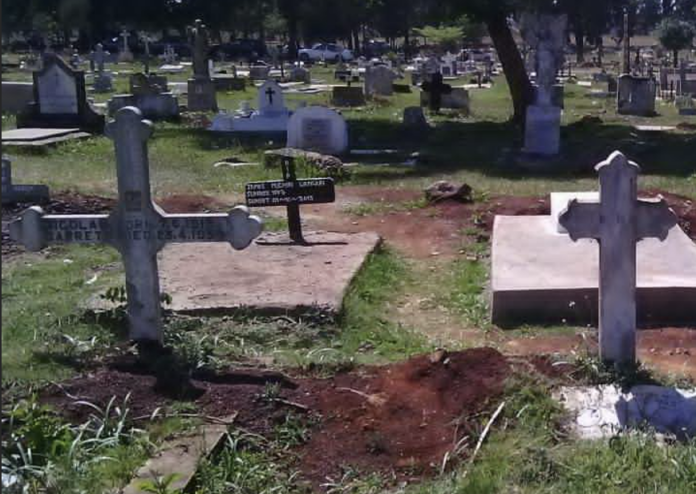Nderitu Maina, who has worked as the undertaker for Langata cemetery for 15 years, says it’s legal under Nairobi County by-laws to bury two people in one grave in the Lang’ata cemetery.
The undertaker’s Job is grouped into burials, exhuming, and cremation. He dismisses any scary stories about the cemetery and graves in general, saying they are myths.
“For instance, if you want your mum buried on top of your dad, one will be buried 6 feet while the other will be buried 4 feet on top. In that case, you will only pay for reopening the grave,”
he says.
The undertaker, a former city mortuary attendant, says there are two types of graves in Lang’ata cemetery; permanent and temporary.
Serving the Dead for a Living: The Story of Caroline Wanjiru
Temporary graves are usually four feet deep. They don’t have headstones and have a lease of 20 years, after which they can be reused. Permanent graves have headstones and have a lease of 99 years.
Lang’ata Cemetry is a 100-acre cemetery that was declared full 20 years ago. But bodies continue to arrive every day for burial. Sometimes it is not even possible to bury them the requisite six feet under, but families have limited options.
Lang’ata Cemetery is about 7 kilometres west of the city center on Langata Road, which is the main road to Nairobi Nation Park.
The cemetery is adjacent to Lang’ata residential estate. It is reached by way of a long driveway off Lang’ata Road.
Ann Mwangangi: Preserving the dead is my passion; Meet bold lady working in morgue
Lang’ata Cemetery, permanent graves for adults cost Ksh30,000, children Ksh4,000, and infants Ksh2,000. Those from outside Nairobi are charged Ksh40,000. Foreigners are charged Ksh 50,000. Temporary graves, adults are charged Ksh 7,000 regardless of where they died.
The county government of Nairobi has been recommending cremation, saying it is affordable. City Hall charges Ksh16 500 to cremate adults and Ksh15,500 for children.
All costs are paid at the city mortuary, where the cash office is located. Mourners are allowed to conduct cultural burying rights, provided they conduct the burials at the right time.
According to Maina, burial myths stem from our African upbringing. The African culture holds graves in great reverence and as places to be feared. However, a grave is just land with a mark indicating that someone is buried there. He concludes by dismissing claims that cemeteries are haunted.
“When you die, you die, there is nothing more. Even at night, there are no spirits at the cemetery. Only dogs or stray animals from the neighbouring Nairobi Orphanage can be seen roaming the cemetery. It’s the most peaceful place,”
he says.
Maina says ghost stories at Lang’ata Cemetery are spread by people who want others to avoid the cemetery to get the privacy to conduct nefarious deals.
The Business of Death: 4 Businesses That Make Millions When People Die in Africa
He adds that stories of bodies being exhumed and coffins getting stolen are lies, as he has never encountered such a case in his 15 years of experience.
“We have ample security around the cemetery. Stealing coffins from the coffin shop is easier than exhuming a grave. Further, the exhumed coffin would be in bad condition,”
he says.
When asked why Lang’ata Cemetery has never filled up despite being in operation for 65 years, he says the question is better directed at his bosses. The cemetery, one of the largest in the country, is 120 acres large. Maina says the facility is currently understaffed, with only six people working there.
Apart from burials, the cemetery offers cremation services. After cremation, mourners can carry the ashes or leave them at the cemetery. However, despite cremation being more economical, the undertaker says most people still prefer the African tradition of burials.








